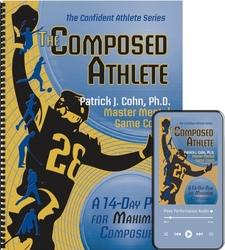
When Does Thinking Become Detrimental?
Is it even possible to replicate good technique in competition without thinking?
Technique and mechanics are crucial for both confidence and success in sports. However, mechanics are quite detailed. There are a lot of moving parts.
For a baseball pitcher to throw strikes, there are many technical variables to consider, such as stance on the mound, wind-up, balance, timing, leg drive, hip rotation, arm angle, finger placement, grip pressure, release point, follow-through, velocity, etc.
Imagine pitching in the bottom of the ninth inning with the bases loaded while trying to think about every aspect that makes up sound mechanics. Even thinking about 1-2 components of mechanics is enough to interfere with throwing strikes.
The same is true for all sports. Overthinking interferes with mechanics, whether it’s a gymnast thinking through their floor routine, a basketball player trying to talk themselves through a free throw, or a golfer over thinking a putt.
When you give yourself too many verbal instructions, your thoughts interfere with fluid mechanics. In other words, under performance is inevitable when you try to process too much information while competing.
There is a time and place to think about mechanics, and that time is in practice. However, even at some moments in practice, switching from conscious thought to performance mode is beneficial.
How can you move from conscious thought to performance mode while competing?
Since you cannot turn your thoughts off, the key is to redirect your focus. There are a number of mental strategies that can help you shift from conscious thought to performance mode, such as:
- Implementing verbal performance cues
- Using relaxation techniques or deep breathing
- Utilizing in-game routines
- Focusing on a focal point in the arena
- Building trusting skills in your training
- Staying grounded in the present
Chicago Bears quarterback Justin Fields was the 11th pick in the first round of the 2021 NFL Draft. In his second season, Fields broke many quarterback rushing records, but he struggled as a passer, finishing 31st in the league in completion percentage.
During the 2023 training camp, the Bear’s coaching staff worked with Fields to improve his passing game. However, the work has not produced any significant improvement through the first three games of the season.
Fields stated he is overloaded with too much information and is overthinking rather than trusting his instincts.
FIELDS: “[The coaches] are doing their job when they are giving me what to look at, but at the end of the day, I can’t be thinking about that when the game comes. I prepare myself throughout the week, and then when the game comes, it’s time to play free at that point. Thinking less and playing more.”
Overthinking is a distraction that prevents you from performing like you have trained yourself to compete.
When you let go of the extra thinking, such as “Let it happen,” you can redirect your focus and get into the flow of the game–allowing you to focus more on tactics.
Use self-talk to help prompt you to switch from conscious over thinking mode to performance mode: “Play on auto pilot.”
When you notice yourself focusing on mechanics, redirect your attention by reciting your verbal cue.
When you make a mistake, avoid analyzing your game during competition and instead save it for after the game or the next practice.
Related Sports Psychology Articles
- How to Read and React Instead of Overthinking
- How to Refocus After Making Mistakes
- How High Expectations Sabotage Athletes’ Mental Game
*Subscribe to The Sports Psychology Podcast on iTunes
*Subscribe to The Sports Psychology Podcast on Spotify
Download a free sports psychology report to improve your mental game!
Learn more about our one-on-one mental game coaching.
The Composed Athlete

“The Composed Athlete” is presented on 80-minute Audio Programs with a 70-page step-by-step workbook that guides you through the program each day. It’s a complete system for conditioning your mind to have maximum composure in competition.
“The Composed Athlete” was developed for any level coach, parent, or junior to professional athlete who wants to improve performance and gain a competitive edge. It does not matter if you are a fledgling junior athlete; or a seasoned professional, plagued with distractions; or you just wanting to learn how to improve your composure…
